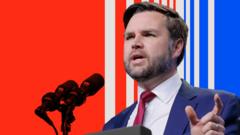As Vice President, JD Vance has gained prominence with his unconventional and often controversial views on America's role in international affairs, challenging both allies and traditional Republican stances.
JD Vance's Foreign Policy: An Inside Look at Trump's Deputy's Global Perspective

JD Vance's Foreign Policy: An Inside Look at Trump's Deputy's Global Perspective
Exploring JD Vance's contentious foreign policy stance and its implications for US relations on the global stage.
In a move that has left global leaders taken aback, US Vice President JD Vance recently showcased his unique perspective on foreign policy during his debut at the Munich Security Conference. Instead of addressing the ongoing crisis in Ukraine, he concentrated on criticizing US allies for their handling of immigration and free speech, accusing European institutions of being disconnected from the people they serve. “If you are running in fear of your own voters,” he stated, “there is nothing America can do for you.” This bold initiation on the international stage has sparked discussions on both his ideology and the future of American foreign relations.
Following this, Vance attracted further attention by confronting Ukrainian President Volodymyr Zelensky in the Oval Office, where he voiced strong feelings that Ukraine had been ungrateful for American support. The Vice President's approach reflects a new intellectual strain of conservatism that merges Trumpism with a critical view of global elites, positioning American workers against the interests of overseas engagements. His admiration for the ‘America First’ approach threads through speeches aimed at spotlighting economic adversity faced by Americans in small towns, stemming from political decisions at the elite level.
Friends and critics alike have noted Vance’s evolution from a “Never Trumper” to a prominent voice in the Trump administration, representing a pragmatic yet dynamic worldview. Cambridge professor James Orr notes, "He is much more of a pragmatist than an ideologue," emphasizing Vance’s focus on American interests over abstract notions of democracy.
Vance has cultivated a narrative that sees the United States’ international commitments, especially concerning Ukraine, as secondary to domestic challenges. "I will be damned if I am going to prioritize Ukraine’s eastern border right now,” he proclaimed, indicating that issues at home, including immigration, should take precedence. His Oval Office confrontation with Zelensky exemplified this sentiment, drawing ire from European allies and further complicating diplomatic efforts amid the ongoing conflict.
As his critics highlight Vance's tendency toward nativism and reactive online culture, his ideologies appear fashionably aligned with internet discussions about reality and perception. Taking cues from conservative influencers online, he vocally engages in debates to shape discourse in a bold manner that resonates with a base eager for change.
This combination of economic protectionism with a disregard for traditional foreign policy “moralisms" reflects how Vance intends to shape US relations moving forward. He has faced backlash for comments that some perceive as dismissive of the complexities of international conflicts, including an allusion to security guarantees which disregarded contributions from allies like the UK and France.
With a global agenda increasingly intertwined with nationalist sentiment, Vance's perspective marks a notable shift among America's political elite, revealing a dichotomy between the traditional ideals of cooperation and modern calls for prioritizing national interests. As Vance grapples with both his past and the future of the Republican Party, the question remains: What does the rise of such an ideologue signify for America's position on the world stage?




















